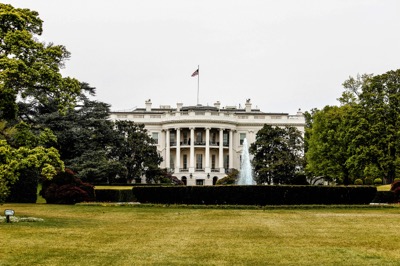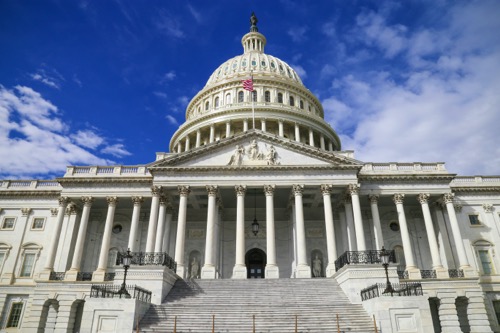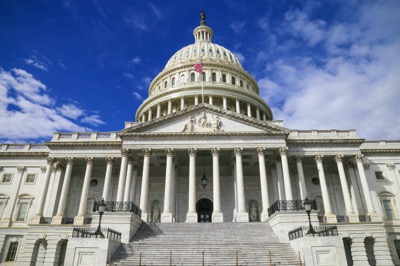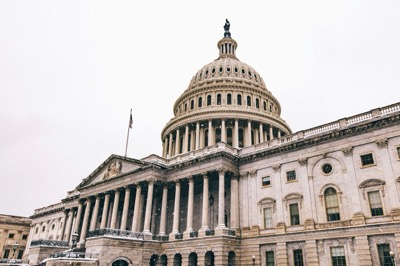December 18, 2024: NPR reported: “Congress flirts with a holiday shutdown as GOP objects to bipartisan spending bill” It was written by Barbara Sprunt and Claudia Grisales.
Republican lawmakers are scrambling to avoid a government shutdown days before Christmas after President-elect Donald Trump and his close advisers came out against a bipartisan spending bill meant to fund the government until March 14.
Government funding runs out at the end of the day on Friday and congressional leaders had hoped to pass a roughly 1,500 page bipartisan spending bill that includes other year-end priorities like farm subsidies, disaster aid and a pay raise for lawmakers. But GOP lawmakers and Trump advisers like Elon Musk and Vivek Ramaswamy on Wednesday pushed House Speaker Mike Johnson, R-La., to back out of the bipartisan deal.
Musk spent the day campaigning against the bill on social media, personally thanking lawmakers who said they won’t support it, and calling on Congress not to pass any bills until Trump takes office.
Ramaswamy shared similar messages on social media platforms and other influential conservative voices like Heritage Action, also came out against the bill.
Even members of the House Appropriations Committee, like Rep. Steve Womack, R-Ark., were venting frustrations.
“In late September, when we passed this last [spending bill], we said we needed to do it because we were running out if time, and here we are at the end of the next deadline, and we’re still running out of time,” Womack said on Tuesday before the final text was released. “The American people are as tire of this as most appropriations.”
The widespread frustration among Republicans could spell trouble for Johnson as he works to retain the gavel for the next session of Congress.
Republican Leaders defend the legislation
Johnson told “Fox and Friends” Wednesday that with this bill, “we are clearing the decks and we are setting up for Trump to come roaring back with the American-first agenda.”
Sen. John Thune, R-S.D., the incoming Senate majority leader, told reporters in the Capitol the bill reflected bipartisan talks that are necessary with Democrats still in power.
“Anytime you are negotiating with a Democratic Senate and a Democratic White House, there are things you don’t like,” Thune said. “At the end of the day, we’ve got some stuff wrapped up hopefully at the end of this year so we’re not dealing with it all next year.”
The spending bill would fund the government at current levels until March 14. It also includes other unfinished business including: roughly $100 billion in federal aid for communities damaged by natural disasters like hurricanes Milton and Helene and wildfires in Maui; money to rebuild the Francis Scott Key Bridge in Baltimore, which collapsed in March, and a pay raise for lawmakers.
House Republicans have also criticized Johnson for giving them little time to review the bill and forgoing a promise to stick to a 72-hour review period for members to assess legislation. Some have floated withholding votes for Johnson on Jan. 3, when the House convenes to elect a speaker.
“It is really a laughingstock. I mean, this [spending bill] is a joke,” Missouri Sen. Josh Hawley told reporters. “And by the way, who it’s worst for is Donald Trump. It only goes until March. So March 14th, we’re going to do this all over again, right in the middle of Trump’s [first] 100 days.”
Democrats stand behind the partisan deal
The legislation released Tuesday was the result of bipartisan negotiations and Democrats said Wednesday that they were unwilling to back away from that pact.
“A deal is a deal. Republicans should keep their word,” White House press secretary Karine Jean-Pierre said in a statement.
House Democrats delivered a sentiment in a brief statement to reporters in the Capitol. House Democratic Leader Hakeem Jeffries said Republicans will “own any harm” if a shutdown happens at the end of the week.
“An agreement is an agreement,” Jeffries said. “It was bipartisan and there is nothing more to say.”
December 18, 2024: The White House posted: “Statement from Press Secretary Karine Jean-Pierre on Republicans Threatening a Government Shutdown”
Republicans need to stop playing politics with this bipartisan agreement or they will hurt hardworking Americans and create instability across the country. President-elect Trump and Vice President-elect Vance ordered Republicans to shut down the government and they are threatening to do just that — while undermining communities recording from disasters, farmers and ranchers, and community health centers. Triggering a damaging government shutdown would hurt families who are gathering to meet with their loved ones and endanger the basic services Americans from veterans to Social Security recipients rely on. A deal is a deal. Republicans should keep their word.
December 19, 2024: The White House posted “Press Secretary Karine Jean-Pierre on Republicans’ Billionaire Giveaway”
Republicans are doing the bidding of their billionaire benefactors at the expense of hardworking Americans. Republicans are breaking their word to support a bipartisan agreement that would lower prescribe drug costs and make it harder to offshore jobs to China — and instead putting forward a bill that paves the way for tax breaks for billionaires whole cutting critical programs working families count on, from Social Security to Head Start. President Biden supports the bipartisan agreement to keep the government open, help communities recovering from disasters, and lower costs — not this giveaway for billionaires that Republicans are proposing at the 11th hour.
December 19, 2024: The White House posted “Statement from White House Press Secretary Karine Jean-Pierre on President Biden’s Travel to Italy”
President Joseph R. Biden will travel to Rome, Italy, from January 9 to 12 to meet separately with His Holiness Pope Francis, President of Italy Sergio Mattarella, and Prime Minister of Italy Georgia Meloni. On January 10, President Biden will have an audience with the Pope and discuss efforts to advance peace around the world. He will also meet with Italy’s leaders to highlight the strength of the U.S.-Italy relationship, thank Prime Minister Meloni for her strong leadership of the G7 over the past year, and discuss important challenges facing the world.
December 19, 2024: “Readout of President Biden’s Call with His Holiness Pope Francis”
Today, President Joseph R. Biden, Jr. spoke with His Holiness Pope Francis to discuss efforts to advance peace around the world during the holiday season. The President thanked the Pope for his continued advocacy to alleviate global suffering, including his work to advance human rights and protect religious freedoms. President Biden also graciously accepted His Holiness Pope Francis’s invitation to visit the Vatican next month.
December 20, 2024: The White House reported: “Statement from Press Secretary Karine Jean-Pierre on the Proposed Legislation to Fund the Government”
A government shutdown heading into the holidays would mean service members and air traffic controllers go to work without pay, essential government services for hardworking Americans would be paused, and economic disruption would occur.
Following an order by President-elect Trump yesterday, Republicans walked away from a bipartisan deal and threatened to shut down the government at the 11th hour in order to pave the way to provide tax breaks for billionaires. This revised legislation does not do that.
While it does not include everything we sought, it includes disaster relief that the President requested for the communities recovering from the storm, eliminates the accelerated pathway to a tax cut for billionaires, and would ensure that the government can continue to operate at full capacity.
President Biden supports moving this legislation forward and ensuring that the vital services the government provides for hardworking Americans — from issuing Social Security checks to processing benefits for veterans — can continue as well to grant assistance for communities that were impacted by devastating hurricanes.
December 20, 2024: The White House reported: “Press Briefing by Press Secretary Karine Jean-Pierre”
MS. JEAN-PIERRE: Good afternoon, everyone.
Q: Hello.
MS. JEAN-PIERRE: A few things at the top.
So, as we announced yesterday, the president will travel to Rome, Italy, in early January to meet separately with His Holiness Pope Francis; president of Italy, Sergio Marttarella [Mattarella]; and prime minister of Italy Meleni — Meloni, pardon me — Giorgia Meloni.
The president will have an audience with the pole to discuss efforts to advance peace around the world. And during his meetings with Italian leaders, he will highlight the strengths of the U.S.-Italy relationship, thank Prime Minister Meloni for her strong leadership of the G7 over the past year, and discuss important challenges facing the world.
We will provide more information in the days to come.
And next, earlier this week, as you all saw, the U.S. International Development Finance Corporation announced a $1 billion financial initiative to support cons- conservation of the Ecuadorian Amazon.
This is a result of the president’s recent trip to the Amazon and a continuation of the administration’s efforts to support innovative ways to address climate change through sustainable growth and development without burdening countries facing financial constraints.
Switching gears just for a second here. Today, President Biden announced student debt cancellation for another 55,000 public service — public service workers, bringing the total number in- — of individuals who have been approved for student debt relief under his administration to nearly 5 million people.
The pe- — the people approved for debts cancelation today include teachers, nurses, service members, law enforcement officials, and other public service workers who have dedicated their lives to giving back to their communities and who are finally earning the relief they are entitled to under the law.
And finally, yesterday U.S. Customs and Border Protection published their November 2024 data, which shows that since President Biden’s — announced new executive actions to secure the border on June 4th, unlawful border crossing have dropped by more than 60 percent. That’s the lowest levels in four and a half years.
The Biden-Harris administration has implemented effective and balanced approach to secure our border and make our immigration system more fair and just.
With that, Colleen, what you got?
Q: Thanks, Karine. So, I wondered if the president has spoken to any lawmakers personally about the potential for a shutdown.
MS. JEAN-PIERRE: So, let me say this — and I know you’ve seen our statements coming from — from here this week about this particular issue. And we’ll just continue to reiterate that Republicans blew this deal. They did. And they need to fix this, period. They have to.
Republican needs to stop playing politics with a government shutdown. And they are doing the bidding — they’re doing the bil — bidding of they billionaire friends — that’s what we’re seeing — at the expense of hardworking Americans.
And just to quote you something that we saw today, and I’m sure you all saw from the poach- — Punchbowl News, which is, and I quote, “This has been an absolute disastrous week for the speaker; the president-elect, Donald Trump; and Republicans on — on Capitol Hill.”
This is a mess that they created, and they need to fix this.
On your question, the president — I can confirm, just moments ago, the president was able to connect with Leader Schumer and Leader Jeffries. And — and also, just to add, that the present does indeed get regular updates. He has been getting red — regular updates from his team. His team has been in touch with members — congressional members from both sides of the aisle. And certainly, he will continue to stay updated.
Q: Has there been any communication between the president or the administration and the incoming administration on this?
MS. JEAN-PIERRE: I think the pres- — I think we have to be really clear here, and that is, this is a mess that Speaker — Speaker Johnson created. It is his mess to fix. There was a deal on the table. They wa– a bipartisan deal. A bipartisan deal. In this day and age, they were able to come up with a bipartisan deal.
And, you know, that agreement, Speaker Johnson needs to stick to. He needs to hold his commitment to that agreement. And so, they have to fix this. This is their — this is their mess that they created, and they need to fix it.
And let’s not forget, we’re ta- — not just — when we talk about keeping the government opening — open, we’re talking about providing fu- — funds for disasters — disaster recovery efforts, loweri — to lower costs of prescription drugs. That’s what we’re talking about.
And the impact of this would hurt our veterans and would hurt vulnerable Americans across the country. That’s what we’re talking about. And Republicans need to do their job, and they need to uphold their side of the deal here.
Go ahead, Selina.
Q: Thanks, Karine. Why hasn’t President Biden said anything in the public about this? Don’t the American people deserve to know why millions of federal workers could enter this holiday period without a paycheck?
MS. JEAN-PIERRE: Well, Americans need to know that Republicans are getting in the way her and they are the ones who created this mess. That’s the reality. That’s the fact.
And the president — and let me just take a step back. We — this is not the first time we’ve been here, and the president has had this approach before. He understands how Congress works. He’s been around for some time. He understand what strategy works here to get this done.
So, this is not — this is not the first time that we’re — I’m being asked this question about the president and his outreach. I just mentioned he made two calls. He was in touch — he was in touch with the leader — the Democratic leaders of both the House and the Senate, Schumer and Jeffries. So — and his team is continuing to have that conversation.
But tis is the mess that was created by Speaker Johnson. He needs to fix this. That’s what the American people need to be very clear about — very clear.
There was a bipartisan agreement, and he’s not holding up his side of the bargain here.
Q: Right. We hear that message from you, but why aren’t we hearing that directly from the president? Why haven’t we seen or heard from President Biden himself?
MS. JEAN-PIERRE: This is something — this is a strategy that we have done many times before. Not the first time. And this is for Republicans in Congress — in the House, specifically — to fix. They created this mess.
There was a bipartisan agreement. There was. There was a bipartisan agreement —
Q: So, the president doesn’t feel the need to come in front of cameras and speak to the American people?
MS. JEAN-PIERRE: There was a bipartisan agreement. There was a bipartisan agreement.
And so, what we want to do and what we want to — what the president wants to make sure we do is — he stands to — ready to help get a bipartisan deal through. That’s what he wants to see.
And, you know, this is something that Republicans should own here. What they tried to jam at the eleventh hour doesn’t reflect and — what the deal — what that bipartisan deal that they came up with — obviously with Democrats. And, you know, they’re showing — Republicans are showing a disregard for the American public — people.
Q: And, just lastly, some leading Democrats are calling Elon Musk “President Musk”, or “Copresident Musk.” What is the White House’s and President Biden’s reaction to this labeling of Elon Musk and whether or not House Republicans are listening more to this billionaire than the president-elect?
MS. JEAN-PIERRE: What I can say is congressional Republicans, at the direction — and you all know this; you all reported this — of President Trump and Elon Musk are, you know, trying to pave the way — what they’re doing is trying to pave. the way for $5 trillion to nat- — to our national debt. That’s what this decision does.
I mean, you’re talking about with — cuts for billionaires, slashing Social Security, slashing Medicare, slashing Head Start.
Congressional Republicans did what they did because of what the president-elect said and what Elon Musk said. That’s the reality. You guys all reported this. That’s why we are where we are today.
So, this is for Speaker Johnson to fix. This is the mess that he created. He needs to fix this.
Again, a bipartisan agreement. There is a bipartisan agreement.
Go ahead.
Q: Thanks, Karine. Would the president support a four-bill strategy that we’ve seen discussed today, which would separate a clean CR from a Farm Bill extension and disaster aid and a debt limit increase?
MS. JEAN-PIERRE: I’m not going to get into hypotheticals.
What I can say is there is a bi- — I’m going to get very repetitive here, because it is true and it needs to be said. There is a bipartisan agreement. There’s a deal that was agreed upon, and that’s what they need to move forward with.
And when I mean “they,” I mean the Republicans in Congress. They need to move forward with that deal. That’s what they said w- — the deal that was agreed upon, that’s what they said they would move forward with. The speaker said that, and he’s not holding up his side of the bargain. He’s not. His side of the deal, he is not holding up.
Q: Any response to President-elect Trump’s statements this morning that “This is a Biden problem, but if Republicans can help solve it, they will”? I imagine you’ll repeat some of what you just said, but un response to that —
MS. JEAN-PIERRE: Congressional Republicans made their decision because of what the president-elect said — as there direction — the direction of the president-elect and the r- — direction of Elon Musk.
There was a bipartisan deal on the table. They were moving forward. The speaker agreed to do this — to move forward with the bipartisan deal. And they stopped that because of what the president-elect said and what Elon Musk said. They wanted to clear a way for their billionaire friends — a tax cut — $5 trillion — $5 trillion to the national debt with tax cuts to billionaires — for billionaires.
So, that’s the reality. You all have reported this. We’ve seen this. We saw — we saw what was being stated, what was being put out there by the president-elect and Elon Musk. There’s no hiding from that. That’s the reality.
And — and so, you know, we’re talking about — this is not politics here. We’re taking about American — the American people who need these program — who need it.
And so, Political [Politico] Playbook said — had to say — what they had to say about this: “Trump picked the fight.” He picked the fight. “And it was Trump — well, with — him and Elon Musk — who sank the bipartisan deal.”
That’s what you all are reporting. You can’t — you can’t twist the facts or change history here.
Go ahead.
Q: So, based on the White House’s assessment of where things stand right now on Capitol Hill, should Americans be prepared for the government to shut down tonight at midnight?
MS. JEAN-PIERRE: There’s still time. We believe there’s still time for that to not happen; for Republicans to do the right thing, to hold up their part of the deal and move forward with the bipartisan agreement. There’s still time.
And our focus is keeping the government open. That’s what we want to see, and we hope Republicans want to do that — Republicans in Congress want to do that as well. And there’s still time.
Q: And we’ve talked a little bit here about how the president really has not been a player at all in these negotiations. I know you said he spoke with Schumer and Jeffries today. But what exactly is his strategy behind that? Is there a sense that perhaps having him involved at this moment would do more harm than good?
MS. JEAN-PIERRE: I just — I just — I kind of took this question. I got some formulation of that question moments ago. The president knows how to deal with Congress. He’s been around for some time, as you all know. And this is not the first time that we’ve had this strategy where we have said it is Congress’s — one of their number one jobs is to keep the government open.
In this particular instance, you saw what Republicans did with Speaker Johnson, leading us to this mess, to where we are right now. And they need to fix it, period. It is their mess to fix. There was a deal — a bipartisan deal — there was — just days ago.
And they created this mess. Speaker Johnson needs to fix this. Republicans in Congress needs to fix this. It is their mess to fix, and they allowed this bipartisan deal to be scuttled by the president-elect.
Q: And if the government shuts down for an extended period of time, would President Biden commit to remaining here in Washington and not going through with his holiday plans?
MS. JEAN-PIERRE: I don’t have anything. I can’t get into hypotheticals. I don’t have anything to share on this. We believe, as I just said moments ago, there’s still time to get a bipar — to get a deal here or move forward — I shouldn’t say “get to a deal” — move forward with a bipartisan agreement.
They can avoid a shutdown. They can. They were on their way to doing that and it was scuttled by the president-elect and Elon Musk. This is why we’re here today. That’s why we’re here today.
Go ahead. Yep. Go ahead.
Q: Karine, you said that House Speaker Mike Johnson needs to fix this. Has President Biden spoken to the House speaker, or does he have any plans to?
MS. JEAN-PIERRE: I’ve answered this in so many ways, and I’m going to answer it now. We got to be really clear. Speaker Johnson created this mess, and he needs to fix it. I don’t have anything else to add beyond that.
He knows — the speaker knows how to fix this. They got a bipartisan deal. He said he was going to move forward with it. They stopped it because of the direction that they were given by president-elect and Elon Musk.
And right now, we need to focus and we need to continue to focus on the American people. We’re talking about shutting down the government. That will impact veterans’ programs, services that Americans truly need.
They know how to fix this. Republicans actually know how to fix this. That’s why they — they were able to get a bipartisan agreement on the table.
They know, in order to move forward with this you need a bipartisan agreement, and there was one, and they did not move forward with it because of what they were told by President-elect Trump and Elon Musk.
Go ahead, Gabe.
Q: Hi, Karine. I’ll go at the question another way.
MS. JEAN-PIERRE: The president is the president of the United States, and he is leading.
And to be very clear, as it relates to this, I’ve said this many times before — moments ago — and I’ll say it again. We have done this strategy before — this is not new — where we have said Congress needs to deal with this. This is — their number one job is to keep the government open. And there was an agreement on the — on the table — not just an agreement, a bipartisan agreement.
Speaker Johnson created this mess. He needs to fix it, period. Period.
Q: To be clear, the strategy is he is leading by staying in the background?
MS. JEAN-PIERRE: The strategy is the Congress — Republicans, in particular — need to do their jobs and get out of their own way and focus on the American people, not their billionaire friends. That is what needs to happen, and that’s what the president wants to see.
Q: Does the president believe that the U.S. debt ceiling should be eliminated?
MS. JEAN-PIERRE: You all know where the president stands on this.
His focus right now is keeping the government open. That’s what he’s going to focus on.
Q: The vice president canceled her trip to California. Can you say why?
MS. JEAN-PIERRE: You would have to speak to her office. I don’t have — I —
Q: And then —
MS. JEAN-PIERRE: — I can’t speak to that.
Q: And then, finally, on Syria, really quickly. The DOD said yesterday that there are about 2,000 U.S. troops in Syria. That’s double what the administration said beforehand.
MS. JEAN-PIERRE: Yeah.
Q: Why the discrepancy?
MS. JEAN-PIERRE: So, I would have to refer you to the Department of Defense to speak to troop numbers. That is their purview. That is something that we have always been pretty consistent on that they have to speak to.
I know that they said yesterday that the additional forces are considered temporary, that they are depleted to — to meet shifting rising req – mission requirements, but I have to leave it to the Department of Defense, to the Pentagon to speak to troops.
Q: But so– last question, Karine.
MS. JEAN-PIERRE: Yeah.
Q: And I know you have tried to answer it several times.
MS. JEAN-PIERRE: (Laughs.)
Q: But shouldn’t Americans hear from the president of the United States just hours from a shutdown?
MS. JEAN-PIERRE: What Americans need to know is that you have Republicans in Congress, in the House who got in a way, who stopped a bipartisan agreement. They got in the way. They created this mess.
And I — and I said this mo- — earlier, when I said — and you all know this; you report this — it is not easy to get a bipartisan agreement here in this town. And there was one.
Both sides sat down. They came to an agreement, which is a good thing for the American people. We thought we were moving in that direction, and they decided to — Republicans decided to, instead, listen and give — give space to their billionaire friends and not put the American people first. That’s what is happening. That’s what we’re seeing.
Go ahead, Michael.
Q: Thanks, Karine. Just wondering if you could give us an update on Nippon Steel’s pending purchase of U.S. Steel. (Coughs.) Excuse me. The panel that is reviewing that transaction is expected to issue its recommendations soon. So, I’m just wondering if you have any update on the timing. And, also, is the president prepared to accept those recommendations, regardless of what they are, or does he plan to block this transaction?
MS. JEAN-PIERRE: I’m not going to get ahead of the president. I don’t have any announcements to make. And — and so, I’m just going to leave it there. Just don’t have anything to share. Don’t have an announcement to make at this time and certainly not going to get ahead of the president at the podium.
Q: (Inaudible) even the timing or —
MS. JEAN-PIERRE: I — I don’t — you know, CFIUS — that’s a CFIUS review. They are independent. We leave it to them to — to make that decision on the timing. I just don’t have anything to share on this.
Go ahead, Karen.
Q: Could you talk a little bit more about the president’s trip next month to Italy?
MS. JEAN-PIERRE: Yeah.
Q: In your statement last night, you said that he had accepted the invitation of the pope to visit next month.
MS. JEAN-PIERRE: Yeah.
Q: How did that come about? Did that just happen on the phone call yesterday?
MS. JEAN-PIERRE: Yeah.
Q: Did the president express interest to the Vatican that he wanted to make this trip? It’s pretty late in a term to be traveling so —
MS. JEAN-PIERRE: Yeah.
Q: — soon — you know, close to the end like that.
MS. JEAN-PIERRE: So — so, I don’t have any information for you. I would like to talk to the team about the timeline.
Look, the president is looking forward to going back to — to Italy. As you all know, he’s been there a couple of times in this — in — in his first term — in this term, and so he’s going to — and he’s met, obviously, a couple of times in this administration alone with His Holiness Pope Francis, and obviously he’s — he looks forward to that.
And as you know, he is — he is a proud Catholic, and so that is something that he certainly was looking forward to that. And — and having a conversation about peace around the world. We know that is an issue His Holiness cares about.
I don’t have specifics or — or behind-the-scenes private conversations on how this land and the timing of this. What we can share is that it’s happening, the president looks forward to it, and we certainly will have more to share as we get closer, like we normally do when an OCONUS trip —
Q: And should —
MS. JEAN-PIERRE: — happens.
Q: — we should expect domestic travel to the president in January? Is he going to be out there doing any farewell speeches on policy issues in other parts of the country?
MS. JEAN-PIERRE: So, I would say, stay tuned. We’ll certainly have more to share about what January will look like for the president. Don’t have anything to — specifically to announce right now.
Go ahead.
Q: Thank you. I’m just going to try to ask this a different way.
MS. JEAN-PIERRE: Yeah.
Q: The president is still —
MS. JEAN-PIERRE: You’re going to get the same answer (Laughs.)
Q: — in office. I — I’m just going to try.
He’s still in office for —
MS. JEAN-PIERRE: Feel free. (Laughs.)
Q: — a month. The American people really haven’t heard from him on whether or not the government is going to shut down. Wouldn’t the message hit differently if the president were out there countering the message that we’re hearing from the president elect an Elon Musk? Why isn’t he speaking on this?
MS. JEAN-PIERRE: Republicans are breaking their word. They are breaking their word to support a bipartisan agreement. We would not be in this position if Republicans in the House did not break their word. That’s where we are.
And we’re talking about the agreement — when you look about — when you think about what their agreement would do, it would lower prescription drugs costs and make it harder — make it harder to offshore jobs to China. We’re taking about veterans who needs some — this — these services.
And they — instead of what they want to do is they put forth a bill that would pave the way for tax break for billionaires. That’s what they did. Instead of going with a bipartisan agreement, they put forth something that would pave the way for their billionaire friends. That’s not about the American people.
And we have been here before when we’re trying to make sure there’s not a government shutdown. The president has had the same — kind of the same strategy. He knows how to work with Congress.
And so, in this instance, the Republicans blew this deal up. They did. They blew it up, and they need to fix it. This is not for the president to fix. This is not for us to fix. This is for Republicans in Congress to fix this — the — the mess that they created.
Q: But has he expressed any thoughts or feelings on the president-elect and Elon Musk’s —
MS. JEAN-PIERRE: You — you —
Q: –inter- —
MS. JEAN-PIERRE: You’re —
Q: –talking about this process?
MS. JEAN-PIERRE: You’re hearing what I’m saying, right?
I speak for the president of the United States, so you’re — when I speak for the president of the United States, I’m speaking directly for him. So, you are hearing where he feels about this, what his thoughts are about this. And we tr- — believe, and the American people should know this, that Republicans need to fix the mess that they caused.
The Speaker knows how to get this right. To get this right is to move forward with a bipartisan agreement — the bipartisan agreement that they had come to nor long ago.
We thought they were going to move forward with that agreement, and they blew it up. They blew it up.
Q: Thanks, Karine.
MS. JEAN-PIERRE: You’re good?
Go ahead.
Q: Thanks, Karine. Has agencies, has the government started informing employees who might be furloughed?
MS. JEAN-PIERRE: Yeah.
Q: You know, those specific folks, especially heading into the holiday season, are they being informed-
MS. JEAN-PIERRE: Yeah.
Q: — that they might not get their paycheck?
MS. JEAN-PIERRE: So, look, we believe that Co- there’s still time for Congress to prevent a partial shutdown. We believe that. But in the interest of t — of prudent planning — we want to be prudent here — agencies did start notifying their employees for — of — of their potential furlough today at noon. And so, on that specific — as it related to furloughs, I would certainly refer you to OM — OMB on those specifics.
Q: And given the high stakes of this shutdown, again during the holiday season —
MS.JEAN-PIERRE: Yeah.
Q: — affecting people like veterans, police officers —
MS. JEAN-PIERRE: Exactly
Q: – et. cetera, will the president speak to the American people if there is a shutdown so that they can hear from him directly —
MS. JEAN-PIERRE: I am not —
Q: — in that moment?
MS. JEAN-PIERRE: I am not going to get into hypotheticals, because we believe, as I just — the beginning of answering your last questions — that there’s still time to prevent a partial government shutdown. We believe th — that Congress — Republicans in Congress could get to a place where they prevent this.
Q: When is the next time that people will hear from the president?
MS. JEAN-PIERRE: I’m not going to get into hypotheticals.
Q: (inaudible.)
MS. JEAN-PIERRE: It is very easy — it — I hear your question, but it is very easy to fix this.
The mess that Republicans created, it is very easy for them to fix this: bipartisan deal agreement. Move forward. Keep — keep your word, Republicans in Congress. Keep your word. Keep your word.
Go ahead.
Q: Thank you, Karine. I have a question on China. In the final month of this adm- — administration, we continue to see high-level talks between the U.S. and China, including last week. Is President Biden making his final effort to strengthen U.S.-China relationship ahead of Trump administration? And are you concerned those (inaudible) you’ve established with China ma– might be abandoned next year? Thank you.
MS. JEAN-PIERRE: So — and I’m just going to repeat what the president has said, what the national security adviser, Jake Sullivan, hav said from this podium ha — about the relationship — the U.S. relationship with China. And what the president remains doing is — and is incredibly focused on is managing the most consequential relationship. You’ve heard both of them say that this is the most consequential relationship. And it is because of the work of this administration that we are handling — handing off the U.S. – China relationship in a stronger, competitive position.
Remember, at the beginning of this administration, we would talk about how it is about competition. That’s how we wanted to kind of see that relationship as well — about competition. So, that’s what the president and this administration is leaving the incoming relationship.
Under President Biden, we have made America stronger and positioned us to outcompete China through significant investments in the United States, developed closer relationship with our allies and partners in the Indo-Pacific, increasing our deterrent capabilities, and diminished China’s ability to exploit our most sensitive technologies.
At the same time, we are carefully managing — and we have carefully managed this relationship through skilled diplomacy to prevent com- — competition from vering — veering into conflict. Remember, that’s what we want. We want competition, not conflict.
So, we’re going to continue to manage this relationship. I’m not going to get into hypotheticals of what the next administration may or may not do. But what I can lay out, as I just did, is how the president has focused on this consequential relationship with — with China — the U.S. – China relationship.
Go ahead.
Q: Thank you. Just following up on Karen’s question on the trip to Italy and what would be the second meeting with the pope. We all know that for the president, his faith is very important, but this isn’t a trip he’s taking as a private citizen. This is a —
MS. JEAN-PIERRE: Yeah.
Q: — a trip he’s taking as head of state.
MS. JEAN-PIERRE: Yeah.
Q: So, what’s the broader message here? Why this choice for what might be his final international trip?
MS. JEAN-PIERRE: So, look, we’re going to have more information, as we normally do. We do background calls, press calls with all of you as we head into an OCONUS. We’re going to do the same. Nothing has changed. And we will lay out the goals, the reasons, what we expect to get out of this trip.
But I tried to give you a little bit of — of what the president — the logistics of what the — who the president is going to meet and — and the discussions that he’s hoping to have.
And let’s not forget, the prime minister is — she’s — she’s the leader of the G7 right now — right? — and has strong — has shown strong leadership, So, that’s in – — important too, to have — for him to have — for him to — to have that — continue that diplomatic conversions with her as well.
And so, certainly, we will have more to share as we get closer to — to the travel.
Go ahead.
Q: Thanks, Karine. There are some Republican lawmakers who are actually advocating for a government shutdown. One example is Marjory Taylor Greene from Georgia. She says “Shut it down.” Can you explain the repercussions of what a partial government shutdown would be for specific groups? For seniors —
MS. JEAN-PIERRE: Yeah.
Q: — for veterans, for those that depend on government services, can you explain what —
MS. JEAN-PIERRE: Yeah.
Q: — this possibility would mean for those individuals?
MS. JEAN-PIERRE: And it is sad that I have to explain that. Really. They are congressional members. Their — one of their p- — duties is to keep the government open because, as you just stated, we’re talking about veterans, we’re talking about vulnerable Americans who need services the the federal government provides in order just to make it to the — through the day.
And it is sad that — you know, what we’re seeing from Republicans is picking their billionaire friends — that’s what they’re doing — not the American people, not our veterans. And we’re talking about basic services that are needed.
OMB certainly could dive in and lay out the different programs that will be affect- — that — that will be impacted, and that will impact Americans if this indeed happens.
But, you know, Jon, we can avoid this. They can avoid this. This does not have to end this way. We do not have to end with a government shutdown and — and really put a — a negative impact on American families, a negative impact on — on our veterans.
This could be avoided. Republicans in Congress don’t have to go this route. They don’t. There was a whole different route that they were going, which would have actually been done in a bipartisan way.
We believe — this president believes that it is important as we move policies, as we move forward on behalf of the American we- — people, we do it in a bipartisan way. And they had that deal.
Q: Do you happen to know if there would be a delay of any kind of Social Security recipients from receiving their checks —
MS. JEAN-PIERRE: Yeah.
Q: — or members of the military from receiving their pay?
MS. JEAN-PIERRE: You’re laying out everything that we are concerned about. Those are the things that we are concerned about. Yes, those are concerns.
But there’s a way out of this. There is. Republicans need to fix this. They need to fix this mess they created. It’s very easy to do.
Q: You do an excellent job advocating on behalf of the president, but do you think the president would do a better job if he was out there making those same ideas —
MS. JEAN-PIERRE: Yeah.
Q: — present to the public in terms of what a shutdown would mean for all of those vulnerable Americans?
MS. JEAN-PIERRE: What I will say is if Republicans need to do their job. I would not be taking — fielding these questions from you all if Repubicans didn’t lead us here. They did. They — they created this mess.
The only reason we’re having this back-and-forth is because Republicans created this mess in Congress — in the House, specifically. They created this mess, and they can fix it. They were on their way to fixing this with the bipartisan agreement.
So, I think the onus is on them to get this right.
Go ahead.
Q: Does the administration have any updates on the whereabouts of Austin Tice compared to last week?
MS. JEAN-PIERRE: Yeah, I don’t have any updates to share. Obviously, it is a priority for this president to get Austin home. That is something that certainly we want to see.
I wil speak to – — Assistant Secretary Barbara Leaf and Ambassador Roger Carstens’ travel to Damascus Syria, to engage with Syrian people — with the Syrian people, including members of civil society, activists, and other Syrians, about their vision of the future of their country and how the United States can help support them.
They also met with representatives of the interim authorities to discuss transition pri- — principles shared by the United States and regional partners.
In their meetings — to your question — they stressed the immense importance of finding missing U.S. citizens, including Austin Tice, and bringing them home. So that is a — continues to be a priority.
Any specifics about that — that meeting, I would refer you to the State Depart – — Department. I know at 12:30 the two State — State Department officials held a – a on-the-record press conference. So, I would refer you to that press conference they had. It might still be going, but they were certainyable to talk in more details and take questions about this. And, again, they — they talk — they touched on — on Austin Tice and this and, more broadly, obviously, bringing U.S. citizens home.
Go ahead.
Q: Does the president have, say, three top priorities for things he still wants to accomplish in the next 32 days he is in office?
MS. JEAN-PIERRE: Well, one of the things that I can say is keeping the government open. Right? We want to make sure that happens.
Congres had a bipartisan agreement. They should move forward. Republicans should not get in the way. Should pi — should chose the Americ- — American people first, not Republican — Republican or their billionaire friends.
And so, that is something that we have said many times from here: that that was a priority for this president.
Certainly, we want to continue to implement — excel the implementation of key priorities that the president has had, meaning the bipartisan infrastructure legislation, the CHIPS and Science Act. We want to make sure that those investments, — that continues, and we want to excel on that.
And we’ve talked about continuing to lower costs as — as it relates to prescription drugs, but lowering costs more broadly, certainly, for the American people.
And so, that’s our focus. That’s what we’ve been doing. And — and we’re going to continue — continue, certainly to do that.
Q: Can we expect more announcements at — on at least some of those fronts in the next few weeks?
MS. JEAN-PIERRE: I — look, I would say “stay tuned.” We are trying to truly, truly run through the tape here and get as much done as you we can for the American people.
And we know that the American people wants us to continue to work on behalf — on their behalf, and that’s what the president is going to be focused on.
Q: And then, really briefly, since you mentioned the shutdown — different angle on that question.
MS. JEAN-PIERRE: Sure.
Q: Potential shutdown, I should say.
MS. JEAN-PIERRE: Yeah.
Q: Should the American people be confident that, in the event of a shutdown, there would still be a smooth transition and inauguration process?
MS. JEAN-PIERRE: That has been the president’s commitment. That has — and that you’ve heard directly from him. We want to make sure that there is a responsible — committed to a responsible transition. And, as you know, his team — he and — he and his team have certainly been working towards that. The team has been preparing for months to make sure that happens.
I will say, though, if there is a shutdown — and I don’t want to get to much into hypotheticals, but this is the reality — transition activities will be restricted and — and with limited exceptions, obviously but — such as prevent imminent threats to the safety of human life or the protection of property. Those are the things that we would — that — you know, that we would have to be concerned about.
And so, we’re doing everything to ensure a smooth transition, but the choice to allow a transition to move forward is within the hands of Republicans in Congress.
You know, we can continue to have this footh — transition — smooth transition of power if they stop threatening a shutdown. And a — and, you know, they have an opportunity — Republicans in Congress have an opportunity to keep the government open so that we can continue what the president commitment has been for months now is to make sure that there is a smooth transition of power.
AIDE: Karine, you have time for one more.
MS. JEAN-PIERRE: Okay.
Go ahead.
Q: Just two clarifications.
MS. JEAN-PIERRE: Yeah.
Q: So, I guess, the first one. Is this trip to Rome the last foreign trip that the president will take?
MS. JEAN-PIERRE: What I can say is the president is going to Italy and is going to an OCONUS trip in January. I — I’m always very careful. (Laughs.) Anything could happen. But what I — what I can say for sue is that the president is certainly going to be going to Italy.
We announced that. We’ll have more to share. I don’t have anything else to share.
Q: And then, secondly, related to the CR. Given what you said about the president’s views on — on debt limit increases or eliminating the debt limit, does that mean that that would be something that would be vetoed by the president if it reached his desk?
MS. JEAN-PIERRE: I — I’m not going to get into hypothetical. I’m just not.
I think what is important here is there is a path forward. There has been a path forward. There is a bipartisan agreement that the Republicans tanked because of what they were directed to do by Elon Musk and President-elect Trump. That’s how it happened . That is the reality that we’re in now.
And this is not the direction that we thought we were going just a couple of days ago.
And so, Republicans blew up this deal. They can fix it. It is their mess tif fix, and they have to choose the American people. They have to do their basic job — is choosing the American people and delivering for them.
Thanks, everybody.
Q: Thanks, Karine.
December 20, 2024: CNN Politics reported: “What’s at risk if Congress doesn’t fund the government by Friday Night” It was written by Tami Luhby, Katie Lobosco and Betsy Klein.
The federal government could shit down in a matter of hours if Congress does not cobble together a temporary funding plan on Friday.
Lawmakers are racing to come to an agreement that will meet with enough support to pass. President-elect Donald Trump torpedoed their bipartisan package on Wednesday, and a slimmed-down House GOP bill that Trump backed failed on Thursday.
The now-dead bipartisan agreement would have kept the federal government operating through March 14, as well as provided nearly $100 billion in disaster aid and economic relief for farmers in rural communities. The deal also would have provided lawmakers with the first pay raise since 2009. The GOP would have also kept the government open through mid-March and included disaster aid funding and a two-year suspension of the debt ceiling, in line with Trump’s demands.
Here’s what Americans could soon face if Congress doesn’t reach a deal by midnight on Friday:
Government shutdown looms
Lawmakers have until the end of Friday to fund the federal government — at least temporarily — to avoid a shutdown. Since Congress has not approved appropriations for any agencies, all would be affected.
But many Americans may not feel the impact immediately since the shutdown would begin on a Saturday, when many federal agencies are closed. That would give lawmakers a little more time to negotiate a deal.
Every department and agency has its own set of plans and procedures for a shutdown, which last occurred during Trump’s first time and stretched from just before Christmas in 2019 to the end of January 2019.
The plans include how many employees would be furloughed, which employees are considered essential and would work without pay, how long it would take to come to a halt. Those plans can vary from shutdown to shutdown.
“While our personnel are prepared to handle high volumes of travelers and ensure safe travel, please be aware that an extended shutdown could mean longer wait times at airports,” TSA Administrator David Pekose posed on X on Thursday, noting that the agency is expecting to screen 40 million passengers over the holidays, through January 2.
Roughly 59,000 of the agency’s more than 62,000 employees are considered essential and would continue working without pay during a shutdown, he wrote.
However, during the 2019 shutdown, hundreds of TSA officers called out from work — many of them to find other ways to make money. So did many air traffic controllers, snarling flights.
The National Parks Service said Thursday that should a funding lapse occur, routine visitor services would be available through Sunday. The agency is still reviewing its contingency plan to determine operations for individual parks.
However some states could use their own funds to keep the national parks within their borders open. When a shutdown loomed in the fall of 2023, Utah said it would keep the Might 5 parks – Arches, Bryce Canyon, Canyonlands, Capitol Reef, and Zion — open, while Arizona planned to keep the Grand Canyon operational. Colorado also said it would keep its four national parks and federal lands open.
The Smithsonian museums and the National Zoo said Friday they will remain open at least through December 26, except for Christmas Day, by using prior-year funds.
The Defense Department’s operations would also be affected by a shutdown, Pentagon spokesman Maj. Gen. Pat Ryder said Tuesday.
“Objectively speaking, a lapse in funding will cause serious disruptions across the Defense Department,” Ryder said, though he noted the agency would “continue to carry out our fundamental responsibility and mission to defend our nation and the American people.”
More than 2 million US military personnel, including active duty and reserves, would continue their duties during a shutdown, according to the latest planning from the Pentagon, but they could potentially work without pay until a deal is reached. It would depend, in part, on whether Congress would pass legislation similar to the one it approved prior to the 2023 shutdown that guaranteed the military would be paid during the impasse.
Meanwhile, the Department of Defense’s robust civilian workforce supporting service members’ efforts could be affected. About 45% of the civilian workforce — more than 800,000 employees – would be furloughed. Ryder warned that it would impact military technicians, among others. And while defense contracts awarded prior to a shutdown continue, the department’s guidance states that “new contracts may not be executed.”
The White House has also previously warned that a lapse in funding could lead to a disruption in military recruitment efforts…
…The Food and Drug Administration would continue to handle and respond to emergencies, including monitoring for and responding to outbreaks related to foodborne illness, supporting food and medical product recalls, screening imported food and medical products and addressing other critical public heath issues, according to the latest guidance from the Department of Health and Human Services. However, food safety inspections could be disrupted…
Trump’s extended shutdown
Trump presided over the longest government shutdown in four decades during his first term. The 35-day impasse ended in late January when Trump agreed to a temporary funding measure that did not include billions of dollars for a border wall.
However, the shutdown wreaked havoc on many Americans and federal employees, including causing flight delays, canceling immigration hearings, and making it harder for some families to obtain student loans.
December 20, 2024: NBC News reported: “What’s happening ahead of a shutdown”
Though it is past the midnight deadline, the government will not shut down.
The House and Senate both passed a bill to keep the government funded through March 14, along with funds for disaster aid.
The White House said that President Joe Biden would sign it into law on Saturday and agencies would not shut down.
The House last night rejected a separate short-term spending bill after Republican leaders scrapped an earlier bipartisan deal and made major changes to appease President-elect Donald Trump, billionaire Elon Musk and restless rank-and-file GOP lawmakers.
A shutdown would have wide-ranging effects inside and outside the government. The Transportation Security Administration warned that a funding lapse would lead to longer lines at airports, while U.S. troops, Border Patrol agents and air traffic controllers would be among the millions of federal employees working without pay this holiday season.
What happens if the government shuts down?
In the event of a government shutdown, all nonessential government functions hit the pause button and the federal government is unable to pay federal employees. Hundreds of thousands of employees could be furloughed for the duration of the shutdown, while others would work without pay.
During a 2023 government shutdown, 850,000 federal employees were furloughed.
The military and federal public safety employees, such as TSA agents and air traffic control personnel, are usually “excepted” from being furloughed and continue to work through a government shutdown. Each federal agency has a contingency plan for how to operate during a shutdown.
Other “essential” functions of the government — such as sending out Social Security checks and payments for Medicare and Medicaid — are expected to continue during a government shutdown.
What is a continuing resolution?
A continuing resolution — often referred to as a “CR” in shorthand — is a stopgap funding measure that temporarily funds the government at current levels for a set amount of time.
Each year Congress is expected to fund the government by Oct. 1, the start of the new fiscal year. If it fails to do so, the House and Senate are also allowed to authorize a continuing resolution to temporarily keep the government operating at previously-approved levels.
In October, both chambers approved a continuing resolution, setting Dec. 20 as the new deadline to fund the government. Earlier this week, House and Senate leaders unveiled the text of a fresh continuing resolution that they hoped to pass on a bipartisan basis to fund the government at current levels through March 14.
Their hopes to pass the deal were dashed after Trump, Vance, and tech mogul Elon Musk spoke out against the bill, tanking GOP support for it.
How Musk and Trump caused Congress’ nightmare before Christmas
It was government shutdown season in Washington, and all through the House, many creatures were stirring — most notably Elon Musk.
Lawmakers in Congress were expecting a glide path to the holidays. They had a bipartisan deal that would keep the government funded and sent them all on their merry way back to their districts.
But then they got a taste of what the next four years might be like with Donald Trump back in the White House and Musk, the world’s richest man, wielding enormous power of the political process.
On Wednesday, Trump – with help from Musk — effectively killed the funding legislator put together by House Speaker Mike Johnson, R-La., a 1,500-page bill packed with the byproduct of the traditional horse-trading the generally defines congressional dealmaking.
Speaker Mike Johnson says to expect House votes this morning
House Speaker Mike Johnson, R-La., said as he entered the Capitol that House votes are expected this morning.
“So y’all stay tuned, we’ve got a plan,” he said.
Freedom Caucus members and other conservatives like Rep. Thomas Massie, R-Ky., have already entered his office.
Vice President-elect JD Vance, still a senator from Ohio, has also arrayed and entered the speaker’s office through a back door.
Trump says if there is a government shutdown, let it happen under Biden
Trump said that if the government is to shut down, it should happen while Joe Biden is still president.
“If there is going to be a shutdown of government, let it begin now, under the Biden Administration, not after January 20th, under “TRUMP.” This is a Biden problem to solve, but if Republicans can help solve it, they will!” Trump wrote on his Truth Social account.
Trump and his allies are responsible for House Republicans’ decision to abandon the bipartisan deal that had already been negotiated to fund the government.
When will the government shut down?
If both chambers of Congress are not able to agree on a deal to pass a funding bill as the clock ticks down to midnight, the government will officially shut down at 12:01 a.m. tomorrow.
Before Trump weighed in Wednesday to tank a bipartisan deal on a continuing resolution, it seemed that both chamber were set to vote on and pass a stopgap bill that would have kept the government open through March 14.
Senate Appropriations Chair Patty Murray slams Musk, vows to stay in D.C. Through Christmas
Senate Appropriations Committee Chair Patty Murray, D-Wash., said in a statement this morning that she’s “ready to stay” in Washington through Christmas because she said Democrats won’t let Elon Musk “run the government.”
“Put simply, we should not let an unelected billionaire rip away research for pediatric cancer so he can get a tax cut or tear down policies that help America outcompete Chime because it could hurt his bottom line,” she said. “We had a bipartisan deal — we should stick to it.”
The spending bill that House Republicans proposed and failed to pass last night had stripped out funding for child cancer research.
The original bipartisan agreement would fund the government and provide disaster relief to various communities across the country, Murray said.
“The American people do not want chaos or a costly government shutdown because an unelected billionaire wants to call the shots — I am ready to work with Republicans and Democrats to pass the bipartisan deal both sides negotiated as soon as possible,” she said.
Shutdown looms as Trump-backed bill fails in the House
The House rejected a bill late yesterday to keep the government funded temporarily after Republican leaders reneged on an earlier bipartisan deal and made modifications to appease Trump, Musk, and an internal GOP revolt. The vote was 174-235, with one Democrat voting present, falling short of the two-thirds majority needed to pass it under a fast-track process.
Trump again calls for elimination of debt ceiling or suspending it until 2029
Trump wrote on his Truth Social account overnight that Congress should either eliminate the debt ceiling or suspend it until after his presidency.
“Congress must get rid of, or extend out to, perhaps 2029, the ridiculous Debt Ceiling. Without this, we should never make a deal. Remember, the pressure is on whoever is President,” he said on his Truth Social account just after 1 a.m.
Trump had called for getting rid of the debt ceiling during a phonically with NBC News yesterday.
What are House Democrats up to today?
House Democrats are planning to meet at 10 a.m. today to discuss government funding, according to an invite obtained by NBC News.
Democrats overwhelmingly voted against a bill last night that would have temporarily funded the government. As many as 38 Republicans voted against the bill as well, leading to the measure falling short of the two-thirds majority needed for approval, per the rules of fast track processes.
A shutdown is slated to begin if a deal is not reached this evening.
GOP member says Republicans are not negotiating with Democrats
Rep. Anna Paulina Luna, R-Fla., told reporters outside the speaker’s office that Republicans aren’t negotiating with Democrats to avert a shutdown.
“We’re not cutting deals with Democrats. We’re going to work it out here. I do not believe that government is going to be shutting down,” she said. “But you guys will see some great stuff very similar to President Trump’s plan yesterday.
She suggested that Republicans were close to another deal, but Rep. Dusty Johnson, R-S.D., said: “Anyone who’s telling you there is a deal is a little ahead of themselves.”
Rep Bob Good, R-Va., the former House Freedom Caucus chair who lost his primary this year, told reporters after emerging from a leadership meeting that he won’t support any measure that incudes a debt ceiling increase that isn’t offset, among other things.
“I’m not voting for a debt ceiling increase that doesn’t have massive spending cuts and structural fiscal reforms,” he said. “I’ve been very clear about that, so I don’t think it’s going to happen.”
GOP Rep. Dusty Johnson says Trump should come to Washington to work out the funding package
Rep. Dusty Johnson, R-S.D., called on Trump to come to Washington to help negotiate a funding package.
“I think that’d be wonderful,” he said in an interview on CNN. “Clearly, the president, incoming president, has some strongly held opinions about what he’d like to see in this package.”
“He is, not infrequently, a disruptive force, and that is a good thing,” Johnson said. “If he got here, I think we would be able to get a really good package together quickly,” he later added.
Johnson’s statement echoed a similar comment made by Sen. Kevin Cramer, R-N.D., who yesterday also called on Trump to come to Washington to assist with funding negotiations.
Rules Committee to meet on how to tackle a funding plan
Rep. Ralph Norman, R-S.C., said the Rules Committee will meet soon to move forward on a government spending plan.
Norman, a member of the committee, said the panel has to. give an hour notice before meeting, and that the notice will go out soon.
When asked if he will support the plan, Norman said yes, but he would not provide details.
The House currently does not have the authority to bring up a rule on the floor the same day it is approved by the Rules Committee. There are procedural work-arounds for this that the House will have to use if Republicans plan to bring the new plan forward on a rule.
Schumer demands Republicans return to the original agreement and work with Democrats
Senate Majority Leader Chuck Schumer, D-N.Y., said in floor remarks this morning that he wants Republicans to return to the original agreement that was negotiated in a bipartisan way with Democrats.
He warned that if Republicans don’t work with Democrats, the government will shut down at 12:01 a.m.
“It’s time to go back to the original agreement we had just a few days ago,” Schumer said. “It’s time for that. It’s time for the House votes on our bipartisan CR. It’s the quickest, simplest and easiest way we can make sure the government stays open while delivering critical emergency aid to the American people.”
Schumer added, “If the House put our original agreement on the floor today, it would pass, and we could put the threat of a shutdown behind us.”
Rep. Barbara Lee says Democrats are ready to negotiate
Rep. Barbara Lee, D-Calif., who sits on the House Appropriations Committee, said Democrats are ready to negotiate on a funding bill and addressed a comment from Rep. Ana Paulina Luna, R- Fla., earlier today saying Republicans are “not cutting deals with Democrats.”
“There was an agreement, and so we’re waiting, ready, willing, and waiting to engage in negotiations,” Lee said. “But you heard what the congresswoman just said, they don’t care. They don’t want to.”
Library of Congress announces its buildings will close if there’s a shutdown
The Library of Congress’ buildings will be closed to the public and researchers if the government shuts down, it said in an advisory.
All public events will be canceled, the advisory said. “Also, all inquiries and requests to the Library of Congress web-based services will not be received or responded to until the shutdown ends.”
David P. Pekoske (@TSA_Pekoske) posted on X “At TSA, part of DHS, about 59,000 of the agency’s 62,000+ employees are considered essential and would continue working without pay in the event of a shutdown. We expect to screen 40M passengers over the holidays and through January 2.
While our personnel are prepared to handle high volumes of travelers and ensure safe travel, please be aware that an extended shutdown could mean longer wait times at airports.”
How will the military be affected if the government shuts down?
If there is an extended shutdown, military pay and civilian pay will halt. Without a deal on Capitol Hill, troops will miss their end-of-month paycheck this holiday season. Military reservists drilling after Dec. 20 will not receive pay for those drills, and federal civilians who are required to work during a shutdown will not be paid either.
Death benefits will also cease during a government shutdown, so if any deaths occur after one begins, the Defense Department could not pay out benefits until Congress passes a continuing resolution or an appropriations bill.
Several Defense Department actions would continue under a government shutdown. For example, military personnel on active duty — including reserve component personnel on federal active duty — will continue to report for duty and carry out assignments.
Military retiree benefits are paid from a trust fund and thus could continue during a shutdown. However, retiree pay may be slowed due to the lack of personnel working to process payments.
House Republicans expect a full conference meeting on the plans
House Republicans, shuttling in and out of the speaker’s office, say they’re likely to huddle as a full conference to assess the new plan formed by their leadership.
The specifics of that plan are being kept close to the vest, as details remain in flux. The same is true of the conference huddle itself: The timing hasn’t yet been provided to members, and given the fluidity of the funding talks, a full conference meeting could get scrapped altogether. For now, however, such a huddle is very much on the table and expected by members.
Rep. Debbie Wasserman-Schultz says Democrats are unified
After the Democratic Caucus meeting this morning, Rep. Debbie Wasserman-Schultz, D.Fla., said on MSNBC that Democrats are on the same page as they work to avoid a shutdown.
“We heard from leader Hakeem Jeffries and our senior members, who are all unified and focused on making sure that we can take care of the needs of the American people based on the votes that we take before the government shuts down,” she said.
What is the debt ceiling?
The debt ceiling is the legal limit set by federal lawmakers for how much the U.S. can borrow to pay its bills. Once that limit is reached, it can trigger a government shutdown because the U.S. is unable to pay its bills unless both chambers of Congress pass a bill to raise or suspend the debt ceiling.
In 2023, lawmakers on Capitol Hill and President Joe Biden reached a deal to temporarily suspend the debt ceiling through January 1, 2025.
The debt ceiling had limited effects on the House and Senate leaders’ deliberations this month on a government funding bill, but yesterday, Trump and Vance said in a statement that they expected Congress to address the debt ceiling before the end of Biden’s term.
“Increasing the debt ceiling is not great but we’d rather do it on Biden’s watch,” the pair said in a joint statement that also tanked GOP support for the current government funding deal that was negotiated on a bipartisan basis.
Yesterday morning, Trump told NBC News that he supported getting rid of the debt ceiling entirely, calling it “smartest thing it [Congress] could do.”
House minority leader says Democrats and Republicans are again talking
House Minority Leader Hakeem Jeffries, D-N.Y., told reporters as he left a meeting with House Democrats that “the lines of communication have been reopened.” with Republicans on the government funding bill.
When asked about the possible new version of a bill, Jeffries said he could not comment without seeing it.
“I can’t comment on a plan when there’s no plan in front of me to evaluate,” he said.
Will national parks remain open in the event of a shutdown?
The short answer is, it depends. According to a National Park Service contingency plan published in March, parks or facilities that can be locked or secured during non-business hours will be closed for the duration of a government shutdown.
Parks that are harder to “close” or secure, “meaning due to their physical characteristics it is impossible or impractical to restrict public access,” will have limited staffing levels that will vary by the size of the park.
But according to the contingency plan, if a government shutdown begins on a Saturday, the National Park Service has a 48-hour period to begin implementing closures and changes, meaning parks may not be closed yet this weekend, for the first two days of the shutdown.
The contingency plan also state that agency workers involved in law enforcement, emergency response, coastal protection and surveillance, fire suppression and several other fields may continue working for the duration of the shutdown.
How are Head Start, WIC and other programs for children affected during a government shutdown?
The food safety net, which includes the Supplemental Nutrition Assistance Program (SNAP), child nutrition programs, and Special Supplemental Nutrition for Women, Infants and Children (WIC), is allowed to continue dispersing benefits in the event of a government shutdown, according to a 2024 U.S. Department of Agriculture contingency plan.
But the contingency plan adds that if funding for these programs runs out during the shutdown, “then program operations for the above programs would cease.”
It’s not clear how long it would take for these programs to run out, but last September, ahead of another possible shutdown that was averted, Agriculture Secretary Tom Vilsack told NPR that WIC benefits could run out “within a matter of days” and predicted SNAP could continue as normal for about a month into a shutdown.
Head Start, a federally funded preschool program for disadvantaged children, would be without federal funds for the duration of a shutdown. Local partners who receive grants from Head Start could continue operating by using funding from other sources, but plenty of other Head Start preschool programs could be shuttered for the duration of the shutdown.
How is the Department of Health and Human Services affected if the government shuts down?
About 45% of employees at the Department of Health and Human Services will be furloughed if the government shuts down, while the remaining 55% will continue working in some capacity, the agency’s contingency plan says.
At the National Institutes of Health, providers will continue to care for patients at the facility’s clinical center and it will admit new patients when “medically necessary.”
Karine Jean-Pierre says Biden is receiving regular updates
White House press secretary Karine Jean-Pierre said at the briefing this afternoon that President Joe Biden has been in contact with Senate Majority Leader Chuck Schumer and House Minority Leader Hakeem Jeffries and is receiving regular updates on government funding talks.
“His team has been in touch with members, congressional members from both sides of the aisle, and certainly, he will continue to stay updated,” she said.
Jean-Pierre also called on the House speaker to come to a solution to fund the government before the shutdown deadline, saying “this is their mess that they created.”
Will D.C. see mountains of trash outside of museums and the National Mall again?
Longtime Washington residents may be accustomed to the unsightly scourge of trash piling up around the National Mall, and outside of Smithsonian museums during federal government shutdowns.
Images of trash piles have been compelling symbols of one impact of past government shutdowns, when the National Park Service was unable to pick up trash at their shuttered sites.
During the last prolonged government shutdown in 2019, D.C.’s local government dispatched extra tag to help keep the garbage cans empty and pick up trash at federal sites, but there’s no word from D.C’s Department of Public Works about whether they plan to do so again in the event of another long shutdown.
Only a third of CDC staff would keep working in a government shutdown
Just 31% of CDC staff will continue working in the event of a government shutdown, according to the agency’s contingency plan. Under a shutdown, the agency will continue its emergency response to urgent disease outbreaks and collecting data reported by states and local hospitals.
But technical assistance to states and local hospitals would cease during a government shutdown. The agency’s research and response to public inquiries about health-related issues would also halt.
Social Security checks continue going out in the case of a shutdown
In the event of a government shutdown, eligible Social Security recipients shouldn’t expect to see lapses in their payments.
But because staffing levels at the agency may be lower than normal, processing time may be extended for the duration of the shutdown.
Millions of people could go without primary health care if the government shuts down
If the government shuts down there will be a swift and major impact on millions of people in the U.S., particularly in underserved areas who will have no access to primary health care. About 32 million people across the country are served by community health center, regardless of their ability to pay.
Federally funded community health centers are non-profit clinics that receive grants from the Health Center Program of the Health Resources and Services Administration. If the grants end, the centers will have no funding for employees or medical care. The Community Health Center Fund provides about 70% of federal money for health centers.
Community Health Centers represent the largest primary care network in the U.S. Health centers have been in existence for nearly 60 years and care for 31.5 million patients nationwide, the vast majority of whom are low-income and need a place to go for affordable care.
Majority Leader Steve Scalise says no consensus, funding vote possible today
House Majority Leader Steve Scalise, R-La., briefly emerged from the ongoing closed-door House GOP conference meeting and said that there could be a “technical shutdown” as no final decisions have been made but a vote is still “possible” tonight.
He said that the most likely plan is to move the three bills, including the continuing resolution, separately but added that they are still discussing what to do about Trump’s debt limit demand.
“It wouldn’t necessarily be in this package,” Scalise added. “The debt limit was taken out because the Democrats walked away from that last night.”
Scalise, like Rep. Dusty Johnson, acknowledged there could be at least a brief, technical shutdown. “There may be a technical shutdown over the course of the evening or the weekend. Those generally don’t mean anything,” Johnson said.
However, Scalise said a vote is still possible tonight, saying “we can stave that off.”
Speaker Johnson: “We will not have a government shutdown”
House Speaker Mike Johnson, R-La., came out of the conference meeting and expressed confidence that there wouldn’t be a government shutdown at 12:01 a.m. tomorrow.
“We have a unified Republican Conference. We have unanimous agreement in the room that we need to move forward. I will not telegraph to you the specific details of that yet,” he said.
“We will not have a government shutdown and we will meet our obligations for our farmers who need aid, the disaster victims all over the country, and for making sure that military and essential services and everyone that relies on the federal government for a paycheck is paid over the holidays,” he added.
House Republicans confident they can vote on a government funding package today
House Republicans leaving the closed-door meeting appeared confident they could vote today on a short-term spending bill, disaster aid and farm bill package — and no debt limit.
They would likely vote under suspension of the rules, which means Republicans would need Democratic support.
Smithsonian museum and the National Zoo can remain open for five days in government shutdown
The Smithsonian advised this afternoon that they have enough prior-year funds to remain open for at least five days if the government shuts down tonight.
Here’s how a shutdown could affect a new Congress and Trump’s inauguration
Trump won’t be sworn in for another month, but a possible government shutdown is raising questions in Washington about how a funding lapse could effect the opening of the next Congress, the certification of Trump’s election and his inauguration.
The short answer: probably not much.
That’s because the employees and functions that support the constitutional duties of the president and Congress — as well as life and property — are exempted from lapses in service.
Though the federal government has never been closed for business in the January following a presidential election, Congress and past administrations — including Trump’s — have plenty of experience with continuing to operate during a shutdown.
On Capitol Hill, parliamentary experts have spent time gaming out what might happen under various scenarios. Here’s what we know — and don’t know — about a first-of-its-kind pre-inauguration shutdown.
The new Congress
Under the 20th amendment to the Constitution, the new Congress convenes at noon on Jan. 3.
A shutdown would not affect that process in its own right because neither lawmakers nor “essential” aides are required to stop working during a shutdown. Some employees deemed “non-essential” would be furloughed, but only those whose jobs are not necessary to lawmaking, security and other functions related to Congress’ constitutional duties.
The administration, which implements shutdown protocols for federal agencies, has no power over congressional employees.
Here’s how a shutdown could affect a new Congress and Trump’s inauguration
Trump won’t be sworn in for another month, but a possible government shutdown is raising questions in Washington about how a funding lapse could affect the opening of the next Congress, the certification of Trump’s election and his inauguration.
The short answer: probably not much.
That’s because the employees and function that support the constitutional duties of the president and Congress — as well as life and property — are exempted from lapses in service.
Though the federal government has never been closed for business in January following a presidential election, Congress and past administrations — including Trump’s — have plenty of experience with continuing to operate during a shutdown.
On Capitol Hill, parliamentary experts have spent time gaming out what might happen under various scenarios. Here’s what we know — and don’t know — about a first-of-it-kind pre-inauguration shutdown.
The New Congress
Under the 20th amendment to the Constitution, the new Congress convenes at noon on Jan. 3.
A shutdown would not affect that process in its own right because neither lawmakers nor “essential” aides are required to stop working during a shutdown. Some employees deemed “non-essential” would be furloughed, but only those whose job are not necessary to lawmaking, security and other functions related to Congress’s constitutional duties.
The administration, which implements shutdown protocols for federal agencies, has no power over congressional employees.
The certification of the election results
While a lapse in federal funding would not stop Congress from carrying out its constitutional duties, the kind of political chaos that led to this month’s shutdown fight could.
Even before lawmakers are sworn in on Jan. 3, the House elected its speaker, which allows for all subsequent business to be conducted. But the current speaker, Mike Johnson, R-La., is on the hot seat — as evidenced by his struggle to find the votes to keep the government open.
In 2023, Republicans took five days — and 15 rounds of voting — to hand the speaker’s gavel to then-Rep. Kevin McCarthy, R-Calif., on Jan. 7.
That raises the prospect that the House could fail to elect a speaker before Jan. 6, the day reserved for Congress to certify the electoral votes that will make Trump president.
If there is no speaker, there is no one with the procedural power to start the counting of the electoral votes. Without a speaker, the just-elected lawmakers cannot be sworn in — meaning they could not cast an official vote to certify the electoral votes or to re-open the government.
No one expects Jan. 6, 2025, to be an echo of the same day in 2021, when a mob of pro-Trump loyalists stormed the Capitol in a vain attempt to stop the certification of President Joe Biden’s loss. But a different kind of chaos — a headless House — is a related possibility.
Because the Senate is a “continuing body,” where two-thirds of its members were not on the ballot in November, it doesn’t face the same procedural hurdles.
Parliamentary experts on Capitol Hill have advised House leaders that there are possible workarounds if Republicans have not come to a consensus on who should serve as speaker by Jan. 6.
“One of the things the House can do if there is trouble, they can elect a temporary speaker, or a speaker that is limited in purpose or duration,” said one former House aide who is familiar with the situation and was granted anonymity to speak candidly.
But, as the expert said, “This is all new territory.
The inauguration
Typically, the new president is sworn in by the chief justice of the United States on the West Front of the Capitol — a rare coming together of all three branches of government at the same time and place. It is a major security event that requires intensive coordination among federal agencies and between the administration, Capitol Police and Washington, D.C., law enforcement officers.
There are employees at each of the federal security agencies that would be subject to furlough during a shutdown, but the Office of Management and Budget is clear in its guidance to agencies that workers who support the president’s official actions and provide for public safety should remain at their posts.
For example, the Department of Homeland Security’s contingency plan for a shutdown envisions retaining 150,063 employees who are “necessary to protect life and priority” and 152 who are “necessary to the discharge of the president’s constitutional duties and powers.”
Even the National Park Service, which has responsibility for the grounds of the National Mall and adjacent landmarks, has a plan to make sure a shutdown would not leave its turf littered. The Park Service can use “the minimal level” of its money to “provide critical health, public safety, and protection services as an exempt activity in a manner that maintains restrooms and sanitation, trash collections … law enforcement emergency operations, and the protection of park resources.”
But ahead of the inauguration, officials are busy getting ready to transfer power and information at federal agencies. An administration official said that while the impact is still unclear, a shutdown will make that work harder.
“A shutdown this close to inauguration will be incredibly disruptive the new administration,” this person said. “It will slow down the offboarding and onboarding process and make it far more difficult for the agency landing teams to meet with their outgoing counterparts. We’re in somewhat uncharted territory here, but this is not how to prepare to take office.
McConnell criticizes House lawmakers over looming shutdown
Senate Minority Leader Mitch McConnell, R-Ky., this afternoon criticized the House for taking Congress to the brink of another government shutdown.
“I don’t care to count how many times I’ve reminded our colleagues and our House counterparts how harmful it is to shut the government down and how foolish it is to bet your own side won’t take the blame for it,” McConnell said in his last floor speech as Senate Republican leader.
He also urged bipartisanship, noting that “getting a legislative outcome in the Senate requires large majorities of people who don’t share all the same views to actually work toward outcomes where they do see eye to eye.”
“We have a choice: Do nothing, or try to find things we agree on and do them together,” he said.
Federal Firefighters say a shutdown could threaten their battle for higher pay
Federal wild land firefighters are bracing to lose their $20,000 retention bonuses if Congress does not act to prevent a government shutdown that would affect millions of workers before the Christmas holiday.
The firefighters have fought for years to establish a permanent pay fix for a job in which some earn as little as $15 an hour for dangerous, backbreaking work.
“It’s like crying wolf over and over again,” said Bobbi Scopa, with Grassroots Wildland Firefighters, an advocacy organization.
Their battle for higher pay is at risk as congressional leaders scramble to find a path forward before 12:01 a.m. Saturday when the government will shut down if a stopgap funding agreement is not reached.
Some 11,200 federal firefighters received a salary boost in 2021 of either $20,000 or 50% of their base pay under the Bipartisan Infrastructure Law. Congress failed to make pay increases permanent and instead extended the bonuses via seven containing resolutions in the years since.
If Congress fails to pass another resolution this week, federal firefighters will not receive their bonuses.
“We will lose everybody,” said Steve Gutierrez, a member of an elite hotshot crew who left the U.S. Forest Service after 15 years to advocate on behalf of firefighters with the National Federation of Federal Employees. “These folks deserve a living wage. The future is going to be a tough road ahead.”
If Congress reached a deal before the deadline, the boosted salary rates would be safe through mid-March.
The U.S. Forest Service did not respond to a request for comment.
With the administration of President-elect Donald Trump scheduled to take over in a month, firefighters and union leaders say their chance to reform the pay scale is slipping away.
During his first term, Trump clashed with Western state governors after catastrophic wildfires consumed millions of acres of public land, and he blame the forest service for mismanagement. In 2018, he suggested California should do a better job of “raking” its leaves.
His new administration is already pushing for less government spending even as climate change stretches the fire season further into the year and makes fires deadlier.
In a recent op-ed published by Fox News, incoming Montana Senator-elect Tim Sheehy, a Republican who was CEO of an aerial firefighting company, argued for “utilizing private resources, which are usually the quickest, most effective response option if we want to limit the size and scope of wildfire damage.
“The private sector always has and always will produce new innovations and better results faster and cheaper than the government,” he wrote. “The same holds true in wildlife response. We must embrace this truth.”
But even municipal firefighters say they depend on federal resources, especially in communities near national forest.
Federal firefighters undergo rigorous training that is a step above what private, state and local crews teach. Their expertise on the front line makes them invaluable in the field and the most sought-after hires by civilian departments.
“Those are the best employees you can get. You know that they’re hungry. They’re amazing.” said Brian Fennessy, fire chief of the Orange County Fire Authority in California and a former hotshot. “It’s sad to watch a once proud agency coming apart like this.”
Firefighters and their advocates have been trapped in a cat-and-mouse game with congressional leaders for decades. Many hoped a permanent solution would be achieved under President Joe Biden, but lawmakers repeatedly punted legislation.
Union leaders were momentarily hopeful when Idaho Rep. Mike Simpson, a Republican and chairman of the House Interior and Environment Appropriations Subcommittee, included a permeant pay fix in the House appropriations bill earlier this year.
In an August op-ed he co-wrote with Rep. Lori Chavez-DeRemer, R-Ore., Simpson decried the current pay structures as inadequate and argued for including a solution in the 2025 fiscal year budget.
“As wildfire seasons grow longer and more intense, the brave men and women on the front lines of these catastrophic blazes are increasingly hailed as heroes,” the op-ed read. “Yet, federal wild land firefighter are frequently subjected to inconsistent compensation despite their essential role in protecting lives, communities, and wildlife. It is well past time to acknowledge their crucial contributions by bringing much needed certainty to pay.”
The House proposal directed $330 million for a pay increase to replace the expiring salary increase and would have included a permanent pay fix, which has since been nixed amid spending disagreements.
Instead, the best firefighters can hope for now is maintaining their current pay through the spring.
“They’re gone for months and they’re making poor wages and in dangerous situations and we’re screwing with these people,” Scopa said. “It’s just unacceptable.”
Frustrated by ongoing problems, federal firefighters have continued to leave the U.S. Forest Service for higher wages at state and local departments. This summer, dozens of federal fire engines remained unstaffed amid another wave of firefighter exoduses.
Advocates for firefighters have repeatedly warned that attrition rates could leave the agency, which protects millions of acres of public land across the country, bereft of its most experienced and skilled workers.
“It’s already pretty bleak,” Gutierrez said.
House is voting now on a new CR
The House is voting now on the new continuing resolution. While its says is a 15-minute vote, that is not firm. The House can keep a vote open as long as needed until the speaker decides to close it.
This bill is under suspension of the rules so it needs 2/3 support to pass. If all current 430 members are present, that number of votes needed is 287.
But if just the 410 members who voted yesterday are there, it’s 274.
Democrats are sill in their caucus meeting, so this vote could take some time
White House says that Biden supports the new funding bill
Biden supports the new bill to fund the government, which Congress is currently voting on, according to the White House.
“President Biden supports moving this legislation forward and ensuring that the vital services the government provides for hardworking Americans — from issuing Social Security checks to processing benefits for veterans — can continue as well as to grant assistance for communities that were impacted by devastating hurricanes,” said White House press secretary Karine Jean-Pierre in a statement.
House passes government funding bill
The House voted to pass a new bill to fund the government, a step forward in efforts to avoid a government shutdown.
The Senate will have to pass the bill as well.
Schumer says he’s “confident’ the Senate will pass the House CR
Senate Majority Leader Chuck Schumer said in a statement following the House vote passing the CR that he’s “confident” the Senate will also pass the measure.
“Though this bill does not include everything Democrats fought for, there are major victories in this bill for American families — provide emergency aid for communities battered by natural disasters, no debt ceiling, and it will keep the government open with no draconian cuts,” he said.
“As I have said, the only way to keep the government open is through bipartisanship,” he added.
The Senate must follow the House and pass the bill in order to send it to Biden’s desk and stave off a shutdown.
Speaker Mike Johnson says he is ‘grateful’ that the House did ‘the right thing’
Shortly after the funding bill passed the House, Speaker Mike Johnson told reporters that he was “grateful” that members of Congress passed the CR.
“We encourage swift passage in the Senate now,” he said. “They need to do their job as the House just did.”
Johnson added that he spoke with Trump and Musk recently as well.
Trump “knew exactly what we were doing and why, and — and this is a good outcome for the country.I think he certainly is happy about this outcome as well,” Johnson said.
When asked by NBC News whether Johnson still wants to be the House speaker, Johnson said that his job “is a challenge in this modern era, but it’s a challenge that we accept.”
“It’s a great honor to serve in the position,” he said. “I wouldn’t say it’s the most fun job in the world all the time, but it’s an important one, a hugely consequential moment for the country.”
Jeffries says House Republicans ‘stopped extreme MAGA Republicans’ in continuing resolution vote
House Minority Leader Hakeem Jeffries, D-N.Y., said that it was House Democrats who “successfully funded the government” in a “victory for the American people.”
“House Democrats have successfully stopped extreme MAGA Republicans from shutting down the government, crashing the economy and hurting working-class Americans all across the land,” Jeffries said in remarks after the continuing resolution vote tonight.
Senate working to lock down a time agreement to pass funding bill tonight
The government funding bill is finally in senators’ hands, and members of the upper chamber are currently working to get a time agreement to pass the continuing resolution tonight.
They will need the consent of all 100 senators to speed up the clock and pass a stopgap bill to avert a shutdown by midnight tonight.
“We’re working through the amendment process right now,” Schumer said when asked whether there will be a vote before midnight.”
There will likely be a series of amendment votes in order for them to get an agreement, but those amendments are expected to fail. If they were adopted, the House would have to come back to vote on the amended legislation.
If the Senate rolled past the midnight deadline, the shutdown would likely only be for a couple of hours and have minimal impact on the functions of the federal government.
The Senate is also working on the Social Security Fairness Act, which it could loop into the same time agreement and pass tonight.
Senate passes funding for pediatric cancer after it was stripped out of the original CR
Sen. Tim Kaine, D-VA, obtained unanimous consent via voice vote for funding of the Gabriela Miller Kids First Research Act 2.0 on the floor tonight.
The legislation reauthorizes funding of the National Institutes of Health (NIH) for pediatric cancer after it was stripped out of the original bipartisan deal on Wednesday. The bill reauthorizes through FY2028 a pediatric disease research initiative within NIH and requires the NIH to coordinate pediatric research activities to avoid duplicative efforts.
The legislation passed the House in March and has been sitting in the Senate since.
Democrats in the House and Senate have criticized Republicans over the last few days for taking out key provisions from the bipartisan deal, most notably pediatric cancer funding. However, the legislation that passed the Senate tonight is not exactly the same a the language the original deal and is ultimately less money overall. per Kaine.
Schumer says both parties have reached an agreement on the spending bill
Speaking on the Senate floor tonight, Schumer said that the exact timing for a vote on the continuing resolution hadn’t yet been determined but that it would be passed before the 12:01 a.m. ET deadline.
“Democrats and Republicans have reached — just reached an agreement that will allow us to pass the CR tonight before the midnight deadline,” he said.
White House: Agencies ‘will not shut down’
It is past midnight, but the government will not shut down while the Senate finishes up its votes, the White House confirmed.
The Office of Management and Budget “has ceased shutdown preparations because there is a high degree of confidence that Congress will imminently pass the relevant appropriations and the President will sign the bill on Saturday,” White House Senior Deputy Press Secretary Emilie Simmons posed on X.
Senate voting now on bill to avoid a shutdown
The Senate is voting now on a continuing resolution to keep the government open until March 14th, 2025. There is a 60-vote threshold, and it is expected to pass.
Speaking on the floor prior to the vote, Majority Leader Chuck Schumer, D-N.Y., said, “Tonight the Senate delivers good news for America” There will be no government shutdown right now before Christmas. … After a chaotic few days in the House, it’s good news that the bipartisan approach prevailed. It’s a good lesson for next year.”
This is the last vote of the 118th Congress.
Senate passes bill to avoid a government shutdown, ending funding fight
The Senate gave final passage to a bill early Saturday morning to keep the government open for three more months, sending it to President Joe Biden’s desk to end the threat of a government shutdown during the holidays.
The vote was 85-11.
the Republican-controlled House passed the bill hours earlier. Although the final vote technically crossed the midnight deadline to avert a shutdown, the White His said that Biden would sign the bill Saturday and avoid forcing U.S. troops, Border Patrol agents, air traffic controllers and millions of other federal workers without pay.
That’s all, folks
That was the last vote of the 118th Congress.
When the Senate returns in a few weeks, on Jan. 3, Republicans will be in charge. Democrats will be cut down to 47 seats. Sens. Joe Manchin, D-W.V.; Krysten Sinema, I-Ariz; Sherrod Brown, D-Ohio; Jon Tester, D-Mont.; Rand Paul, R-Ky.; and Mike Lee, R-Utah; will be committee chairmen.
The House, with an even smaller Republican majority than they had this Congress, will need to start the new session by electing a speaker.
December 20, 2024: ABC News reported “House passes bill to avert government shutdown”
The House of Representatives passed the two-thirds majority to pass the funding bill to avert a federal shutdown tonight. The bill, which funds the government until March, will head to the Senate.
December 20, 2024: NBC News reported: “Senate passes bill to avoid a government shutdown, ending funding fight at the 11th hour”
It was written by Scott Wong, Sahil Kapur, Ali Vitali, Julie Tsirkin, Kyle Steward, and Kate Santaliz
The Senate gave the final passage to a bill early Saturday morning to keep the government open for three more months, sending it to President Joe Biden’s desk to end the threat of a government shutdown.
The vote was 85-11.
The Republican-controlled House passed the bill hours earlier. Although the final vote technically went past the midnight deadline to avert a shutdown, the White House said that Biden would sign the bill Saturday and avoid forcing U.S. troops, Border Patrol agents, air traffic controllers and millions of other federal workers to work without pay.
“Agencies will not shut down and may continue normal operations,” Emilie Simons, White House Senior Deputy Press Secretary, posted on X.
The House voted 366-34, with all opposition coming from Republicans and one member voting present. It capped a tumultuous week that foreshadowed how the new Congress in January might deal with a mercurial Donald Trump back in the White House.
The package funds the government at current levels through March 14, and includes $100 billion in disaster aid and one-year far bill — while stripping out a debt limit extension demanded by President-elect Trump earlier in the week.
On Wednesday, Trump had threatened to primary “Any Republican” who voted for a funding bill without a debt limit extension; on Friday, 170 House Republicans did just that.
“We are really grateful that tonight, in bipartisan fashion, with overwhelming majority of votes, we passed the American Relief Act of 2025. This is a very important piece of legislation,” House Speaker Mike Johnson, R-La., told reporters after the vote. “It funds the government, of course, until March of 2025. That was a big priority for us.”
He vowed that “things are going to be very different around here” next year when Trump returns and Republicans capture the Senate.
Senate Majority Leader Chuck Schumer, D. N.Y., called it “good news” late Friday that the Senate had reached unanimous agreement to skip the usual hurdles and speedily pass the funding bill.
Just three days ago, House and Senate leaders from both parties struck an agreement to keep the government’s lights on, but Trump and his billionaire confidante Elon Musk killed the deal, insisting at the eleventh hour it needed to extend or abolish the debt limit to make way for Trump’s agenda next year.
A backup plan — slimmed down from the original deal and endorsed by Trump and Musk — went down in flames on the House floor, tanked by Democrats as well as 38 Republicans who objected to the debt extension.
That left Johnson, who is fighting to keep his speakership, with few good options. After privately huddling with rank-and-file Republicans for more than two hours Friday, Johnson told his party he was pressing forward with Plan C: the same package brought to the floor a day earlier but without Trump’s debt increase.
Exiting the private GOP meeting, Johnson told reporters there would not be a shutdown and that House Republicans are “unified.”
“We will not have a government shutdown, and we will meet our obligations for our farmers who need aid, for disaster victims all over the country, and for making sure that the military and essential services and everyone who relies upon the federal government for a paycheck is paid over the holidays,” Johnson said.
Johnson said he spoke to Trump and Musk on Friday. “I’ve talked to President Trump, in detail, and he knows exactly what we’re doing,” the speaker said.
Musk appeared to endorse the plan as the House was voting, writing on his social media site X that Johnson “did a good job here, given the circumstances.”
The president-elect had chosen to remain silent on the bill, according to another source familiar with his thinking. Trump’s preference was still to address the debt ceiling, that source said, adding, “Johnson should have listened when the President-elect told him this a month ago. And in every conversation since.”
But Trump may be willing to take a “win” on a funding deal the cuts a significant amount of what he say as “pork,” the source continues, noting that the process gave Trump’s team insight into where votes are in both parties for dealing with the debt limit next year.
To get around Trump’s last-minute demand of raising the debt ceiling, Republicans have instead agreed to commit to slash more than $2 trillion in government spending and tuck a debt hike likely into a reconciliation package next year, according to multiple lawmakers.
Some Republicans doubt the debt limit pack is worth the paper it’s printed on.
“They call the a gentleman’s agreement, I think,” said Rep. Tim Burchett, R-Tenn. “And there are no gentlemen up here, dude.”
December 21, 2024: The White House reported: “Statement from President Joe Biden on the Bipartisan Government Funding Bill”
The bipartisan funding bill I just signed keeps the government open and delivers the urgently needed disaster relief that I requested for recovering communities as well as the funds needed to rebuild the Francis Scott Key Bridge.
This agreement represents a compromise, which means neither side got everything it wanted. But it rejects the accelerated pathway to a tax cut for billionaires that Republicans sought, and it ensures the government can continue to operate at full capacity.
That’s good news for the American people, especially as families gather to celebrate this holiday season.
December 21, 2024: “Press Release: Bill Signed: H.R. 10545”
On Saturday, December 21, 2024, the President signed into law:
H.R. 10545, the “American Relief Act, 2025”, which provides fiscal year 2025 appropriations to Federal agencies through March 14, 2025, for continuing projects and activities of the Federal Government; provides disaster relief appropriations and economic assistance to farmers; extends the Agriculture Improvement Act of 2018; and extends several expiring authorities.
December 21, 2024: CNN Politics posted: “Here’s what’s in and out of the government funding agreement” It was posted by Katie Lobosco and Tami Luhby.
The Senate approved slimmed-down, temporary government spending plan early Saturday morning, averting a shutdown of the federal government. President Joe Biden signed the bill into law later Saturday morning.
The passage of the package came after President-elect Trump torpedoed a bipartisan agreement struck earlier in the week. A House vote on a Trump-endorsed funding bill failed on Thursday evening, but the chamber then approved a revised bill Friday evening.
The legislation funds the government through March 14, setting up another spending shutdown in the early days of the Trump administration. Republicans will control both the Senate and the House come January, but the party will have slim margins in both chambers.
The package also retains billions of dollars in disaster relief sorely needed by states hit hard earlier his year by two major hurricanes.
Here is what else is in the bill:
More disaster aid funding
The spending bill provides about $100 billion to help Americans trying to recover from multiple national disasters in 2023 and 2024. The funding is in line with the roughly $100 billion topline request from the Biden administration in November.
Some $29 billion will help replenish the Federal Emergency Management Agency’s Disaster Relier Fund, which has dwindled after contending with two major hurricanes that ripped through the Southeast earlier this year, as well as other disasters.
In October, FEMA spend $9 billion of a $20 billion infusion from Congress, responding to Hurricanes Helene and Milton. The agency also had to handle wildfires, floods, and tornadoes this year. Federal data shows the costly disasters are now happening more frequently.
Economic aid for farmers
The bill includes $10 billion economic aid for farmers, one of the last sticking points in negotiations earlier this week. Lawmakers from agriculture-focused states have argued that the help is desperately needed as the US’s famers are facing lower commodity prices and higher costs for supplies.
The spending agreement also includes a one-year extension of the farm bill — a sweeping package that governs many agricultural and nutrition assistance programs. Typically, the bill is renewed every five years, but the most recent version was passed in 2018 and the extension lapsed at the end of September. The continuing resolution extends it for a year.
Maryland bridge funding
Under the bill, replacing the Francis Scott Key Bridge in Maryland will be fully funded by the federal government. The legislation will also allow the US Treasury Department to recoup money from any settlements related to the bridge’s collapse to help pay for the rebuilding.
A cargo ship crashed into the bridge in March, causing it to collapse and severing access to critical shipping rounds in and out of the Port of Baltimore. Six workers on the bridge were killed.
Rebuilding the bridge could cost between $1.7 billion and $1.9 billion, according to an estimate released by the Maryland Transportation Authority earlier this year.
Extending Telehealth flexibilities in Medicare
The funding agreement also includes a three-month extension of a pandemic-era measure that expanded the use of telehealth in Medicare.
More senior citizens and Americans with disabilities have been able to get care via telehealth since the COVID-19 pandemic began in early 2020. Eligibility for the service was broadened beyond just those living in rural areas, and seniors have been able to conduct the telehealth visit at home, rather than having to travel to a heath care facility.
December 21, 2024: ABC News posted “Biden signs short-term government funding bill”
President Joe Biden signed into law the short-term funding bill on Saturday, according to a release from the White House. Biden signed the bill this morning after lawmakers sent it to his desk after late-night negotiations.
December 21, 2024: The White House posted: “Press Release: Bill Signed: HR 10545”
On Saturday, December 21, 2024, the President signed into law:
H.R. 10545, the “American Relief Act, 2025”, which provides fiscal year 2025 appropriations to Federal agencies through March 15, 2025, for continuing projects and activities of the Federal Government; provides disaster relief appropriations and economic assistance to farmers; extends the Agriculture Improvement Act of 2018; and extend several expiring authorities.
The bill extends funding for the government until mid-March, has $100 billion for disaster aid, something the White House wanted, and extends funding for farmers.
December 22, 2024: Reuters reported: “Senate passes government funding bill, averts shutdown” It was written by Richard Cowan, Bo Erickson, Andy Sullivan, and Katherine Johnson.
The U.S. Congress passed spending legislation early on Saturday in a down-to-the-wire burst of activity that will avert a destabilizing government shutdown ahead of the busy holiday travel season.
The Democratic-controlled Senate in a 85-11 vote passed the bill to continue government funding 38 minutes after it expired at midnight (0500 GMT Saturday). The government did not invoke shutdown procedures in the interim.
The bill will now be sent to the White House, where President Biden is expected to sign it into law.
The package had earlier cleared the Republican-controlled House of Representatives with bipartisan support.
The late-night vote capped a frantic week that saw President-elect Donald Trump and his billionaire ally Elon Musk defeat an initial bipartisan deal, throwing Congress in disarray.
The final version stripped out some provisions championed by Democrats, who accused Republicans of caving in to pressure from an unelected billionaire who has no experience in government.
Congress did not act on Trump’s demand to raise the debt ceiling, a politically difficult task, before he takes office on Jan. 20.
The federal government spent roughly $6.2 trillion last year and has more than $36 trillion in debt, and Congress will need to act to authorize further borrowing by the middle of the year.
The legislation would extend government funding until March 14, provide $100 billion for disaster-hit states and $10 billion for farmers, and extend farm and food aid programs due to expire at the end of the year.
Some Republicans voted against the package because it did not cut spending. House Speaker Mike Johnson said the party will have more influence next year, when they will have majorities in both chambers of Congress and Trump will be in the White House.
“This was a necessary step to bring the gap, to put us in that moment where we can put our fingerprints on the final decisions on spending,” he told reporters after the House vote. He said Trump supported the package.
A government shutdown would have disrupted everything from law enforcement to national parks and suspended paychecks for millions of federal workers.
A travel industry trade group warned it could cost airlines, hotels and other companies $1 billion per week and lead to widespread disruptions during the busy Christmas season. Authorities warned travelers could face long lines at airports.
THIRD ATTEMPT
The package resembled a bipartisan plan that was abandoned earlier this week after an online fusillade from Trump and Musk, who said it contained too many unrelated provisions, such as a pay raise for lawmakers and a crackdown on pharmacy benefit managers.
Republicans struck most of those elements from the bill — including a provision limiting investments in China which Democrats said would have conflicted with Musk’s interests.
“He clearly does not want to answer questions about how much he plans to expand his businesses in China and how many American technologies he plans to sell,” Democratic Representative Rosa DeLauro said on the House floor.
Trump has tasked Musk, the world’s richest person, with heading a budget-cutting task force but he will hold no official position in Washington.
Musk wrote on his social media platform X that he was happy with the package. “It went from a bill that weighted pounds to a bill that weighted ounces,” he posed.
House Democratic Leader Hakeem Jeffries said his party still achieved some of its goals and prevented Republicans from enacting a debt-ceiling hike that would make it easier to cut taxes.
“We have successfully advanced the needs of everyday Americans, but there are still things to be worked on and we look forward to the fight in the new year,” he told reporters.
Trumps demand to life the debt ceiling was resoundingly rejected by the House — including 38 Republicans — on Thursday.
Johnson said lawmakers would look at the issue in January.
Representative Rich McCormick, one of the 34 Republicans who voted against the Friday bill, said it did nothing to change the nation’s fiscal trajectory and would only add to the debt load.
“We will be the country of the past if we continue doing what we’re doing,” he said.
The federal government last shut down for 35 days during Trump’s first White House term over a dispute about border security.
Previous fight over the debt ceiling have spooked financial markets, as a U.S. government default would send credit shocks around the world. The limit has been suspended under an agreement that technically expires on Jan. 1, though lawmakers likely would not have had to take the issue before the spring.


























